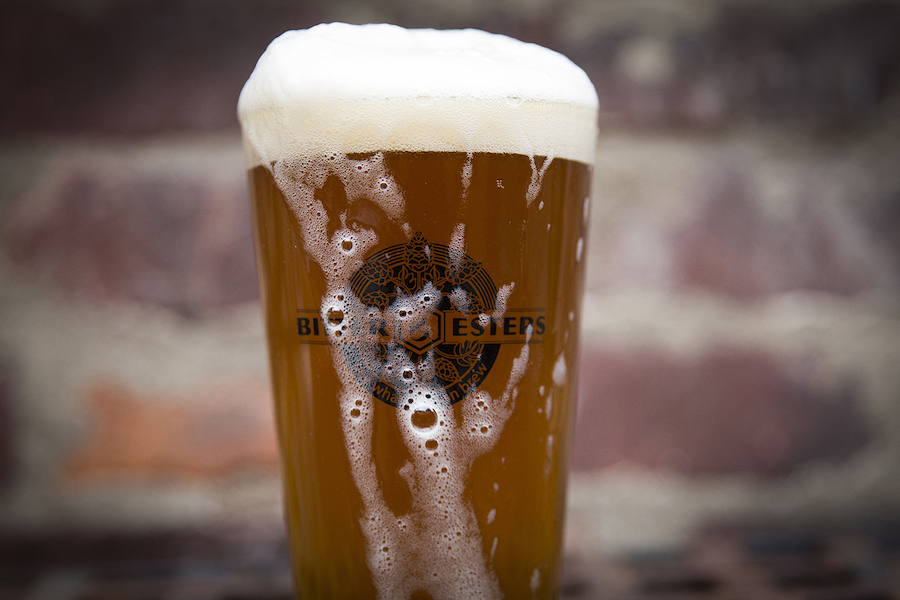The most special thing at Bitter & Esters, Prospect Heights’ brewing supply shop, isn’t their supply of hand-cracked grains, foiled bags of heirloom hops or the Ball jars offering bitter orange peel or coriander seed by the ounce.
It’s a three-tier stainless-steel Blichmann Engineering BoilerMaker system, essentially a mini-brewery that can produce 15 gallons at a time.
Unlike every other homebrew supply shop in the state, four-year-old Bitter & Esters offers what owners John Lapolla and Douglas Amport call “brew on premises.” In other words, you can make beer here: By taking the $55 beginner “Brewshop 101” classes held three times a week, say, or renting the equipment to make a six-case batch of Paradise Very Pale Ale or Sweet Milk Stout.
From the start, the goal of the shop was to function not as a store piled high with refractometers (for testing the fermentable sugars in your wort) or rhizomes (if you want to grow your own hops) but rather as a homebrew headquarters, a clubhouse for amateurs, aspiring brewers and newbies alike to share ideas and the occasional brew.
“Our focus is really on community,” says Amport, whose first business venture with Lapolla was hosting a music night at a Lower East Side club when both played in bands. (Pile of Kittens and Soy Dracula, respectively.)
Both had long been into home fermentation before they opened the store in early 2011. Amport, a video and interactive producer, made wine. Lapolla, who formerly ran a printing press and worked as an audio engineer, had been brewing since the 1990s, after deciding to make his own with a friend after visiting a beer festival in San Diego. (“It was terrible,” he recalls.)
“One day we were, just, ‘You know, we should really open our own brew shop,’” says Amport, noting that at that point there weren’t any in the city. Adding the ability to brew in the store was a way to lure regulars who could already buy anything they needed online, he says. Originally their idea was to make it more like a co-op, where advanced homebrewers could share both ideas and bigger, better equipment than most city apartments would allow.
But the Blichmann BoilerMaker turned out to appeal to a broader audience, once that includes folks who take that basic class simply as recreation — a date night or bachelor party — or those who run test batches perfecting recipes for upcoming breweries, like the new Yonkers Brewery.
The four-hour make-your-own sessions start at $400; then you come back a few weeks later after fermentation to take a taste of your hard work — “That’s your alcohol, you wrangled those yeasts,” Lapolla congratulated one recent maker as he sipped a sample — and bottle your brews to take them home.
The classes have taken off, too. Now there are advanced models comparing both method and flavor for specific hops or yeasts, or how to move from extracts to working with grain. There are casual beer-making demos, contests where home-brewers “guess the secret ingredient,” or even special training sessions for those who sell suds, like some of the staff at the Nomad, who came in for a beer-making session one recent afternoon.
Those who are hooked by the process tend to come back not just for supplies — “We make our own customers,” says Amport — but for the first Wednesday evening of each month, when Amport and Lapolla host a “brew swap.” The price of admission is a beer (preferably homemade) to share.
Over a table laden with growlers, repurposed beer bottles and dozens of spent tasting glasses, “luminaries” (the Bitter & Esters term for skilled and dedicated regulars) mingle with new brewers looking for help with the flavor of their black IPA or a shandy with a too-foamy head.
Lapolla and Amport know free trouble-shooting is only part of the night’s appeal: “Every time I come in,” says Liz Thomas, a recent 101 grad sharing her first attempt at an easy-drinking ale with a couple who made peanut butter–flavored brew, “I make new friends.”
Photo credit: John Taggart



